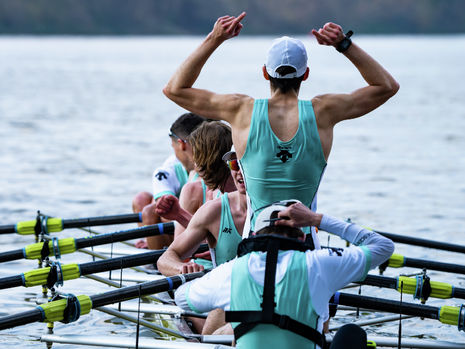‘Feeling Blue’: the downsides of Cambridge’s sporting system
Jacob Tucker decries the commodification of sporting prowess, and assesses its parallels with the rest of Cambridge life

In trying to get a place at a reputable university after A-levels, students find themselves trying to collect UCAS points. Five A*s equals 280 points; three Es are only 48. As a purely academic measurement this seems fair: get higher grades, take a risk and opt in for more courses, and it might pay off. However, this system becomes quite exploitative when extracurricular activities are also taken into account. Playing an instrument can land you up to 30 more points – more than an additional AS-level. A qualification in horse riding is considered equivalent to a C. Even volunteering can be used for points.
It’s all rather cynical. A lot of teenagers up and down the country have no doubt taken on skills they don’t care about for the sake of collecting a few more imaginary points. A pessimist might say that even something as cherished as DofE has been reduced to some sort of greedy ruse to keep Go Outdoors in business. Personal statements are yet another quantifiable template in a sea of judgement by which the “objective” value of a teenager can be scored.
But, if Cambridge doesn’t care about UCAS, and is thinking of scrapping personal statements, then what relevance could these systems hold here? What an earth does this have to do with sport?
“Personal statements are yet another quantifiable template in a sea of judgement”
The Cambridge Blues system for sports has a far longer history than something as pithy as UCAS. The first game between Cambridge and Oxford, the rivalry which ultimately led to the Blue and half-Blue becoming tangible achievements, was organised by Wordsworth’s nephew in 1829. It’s traditional, some might say. It’s beyond rebuke. To an extent, this is true. As a tradition, the system is interesting and iconic. And it is a valuable achievement, too. To have both a degree and a full-Blue from Cambridge is a pretty remarkable achievement. You’re well-rounded. You’re probably more interesting than the average person. You can make jokes about it and visit special clubhouses.
The problem with this system is not a result of tradition or iconography. These are the benefits. The issues arise when achieving an award in sport becomes yet another mark of differentiation.
“Don’t play tennis, run, or play football for the sake of your future employer”
Academic inflation is a more pressing issue than most students like to admit. More and more people are attaining degrees, which therefore decrease in social value. So, more people go on to do a master’s. The same thing happens. And then again with PhDs. Nowadays, we specialise in order to stand out, not out of necessity, or because of a genuine love for our field. You get a place at Cambridge. Well done, but you’re not quite special enough yet. The marketplace for your subject is likely extremely competitive: the “Cambridge” brand name will help, but it might not be enough. You’re on track for a First. Still might not be enough. So, where can you turn?

Is Pole Dancing a Sport?
This is the problem with the system of Blues. They do represent something important. They’re a piece of history. They’re something for anyone with a genuine interest in sport to strive for. However, to think of this prestigious award as simply another collectible accomplishment is disingenuous. We’re all grownups here. We shouldn’t need to rack up imaginary points to satiate our egos.
Don’t play tennis, run, or play football for the sake of your future employer. If that’s really something a law firm or publishing company or tech corporation feels strongly about, they’re likely faking it just as much as you are.
Get involved with sport because you love it. There’s no better reason.
 News / Judge Business School advisor resigns over Epstein and Andrew links18 February 2026
News / Judge Business School advisor resigns over Epstein and Andrew links18 February 2026 News / Hundreds of Cambridge academics demand vote on fate of vet course20 February 2026
News / Hundreds of Cambridge academics demand vote on fate of vet course20 February 2026 News / Petition demands University reverse decision on vegan menu20 February 2026
News / Petition demands University reverse decision on vegan menu20 February 2026 News / CUCA members attend Reform rally in London20 February 2026
News / CUCA members attend Reform rally in London20 February 2026 News / Gov grants £36m to Cambridge supercomputer17 February 2026
News / Gov grants £36m to Cambridge supercomputer17 February 2026









